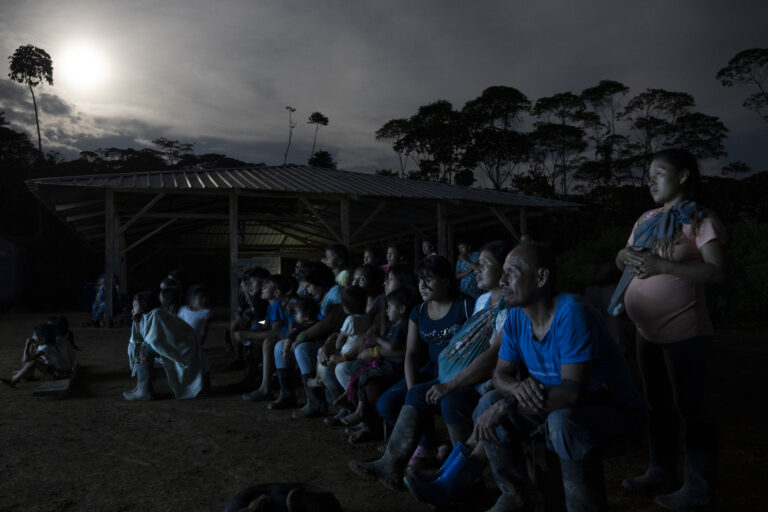
KANUA: the first floating film festival to navigate the Ecuadorian Amazon
20 September, 2024Kanua, the Amazonian Floating Film Festival, brought cinema to remote communities in the Ecuadorian Amazon on a solar-powered canoe. Members of the festival team reflect on a sustainable journey of cinematic and cultural exchange. This piece was translated from Spanish by Rebecca Wilson and edited by Leon Elliott.
Outsiders have historically been exposed to a distorted representation of the Amazon which exclusively associates the region with its animals and vegetation. They forget that the Amazon is also made up of people, and that we have stories to tell.Elizabeth Andi, artist and member of the Kanua Festival team.
Kanua Film Festival emerged through a conversation between various members of Tawna – a film collective focused on Amazonian narratives – and Oliver Utne, the founder of Kara Solar, a foundation dedicated to constructing clean transport networks and encouraging technological independence. Oliver mentioned that one of their solar-powered canoes would travel across a swath of Achuar territory in the Ecuadorian Amazon, later to be handed over to the Wayutsentsa community to form part of their community transport system. At Tawna, we had already been dreaming about the idea of bringing cinema to rainforest communities. So we posed the question: ‘Would it not be possible to use the boat’s energy to screen films along the way?’
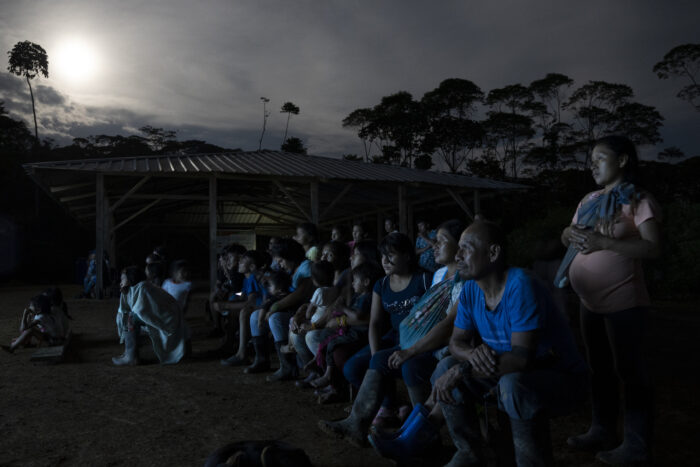
A few weeks later and we were developing the project: Kanua, the Amazonian Floating Film Festival. We put together a project file, firmed up our creative concept, and launched a call for entries for pan-Amazonian and global filmmakers who had made films about preserving nature, defending our territories, Indigenous rights, cultural diversity, and identity. We received over 56 films, out of which we selected 29, including 19 Amazonian productions.
The festival was conceived as a space for cultural exchange between diverse Amazonian communities. As Boloh Miranda, Kanua Festival director explains, ‘the Kanua programme showcases films about environmental conservation, Indigenous peoples’ rights, cultural diversity, and identity, with the bulk of them directed by Indigenous filmmakers. For us it’s very important to connect different territories and their shared struggles, and the stories they want to tell through cinema.’
Sustainable cinema made in our territories
Tawna, a word in Kichwa for the oar you steer the canoe with through the Amazonian rivers, embodies this cinema project which is deeply rooted in the rainforest. Our film collective was born out of the desire to connect different territories and their forms of resistance using the camera as our oar.
Tawna is an anticolonial film collective made up of activists, filmmakers, independent members of Sápara and Kichwa communities, and non-Indigenous Ecucadorians, with a focus on Amazonian visual narratives. It was formed in 2017 in response to the need to document extractivist threats and the community resistance to them which has strengthened the cultural legacy of Ecuadorian Amazonian territories.
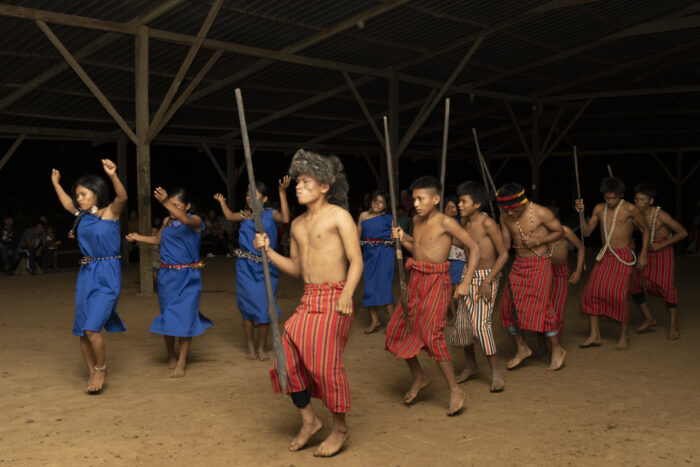
The collective develops multidisciplinary works through formative processes with Amazonian communities. These workshops converge in the creation of original, intimate, collective, and experimental narratives, made in the territories.
During the last five years, Tawna’s films have been shown at a range of high-profile events and exhibitions, like Chilean artist Cecilia Vicuña’s ‘Brain Forest Quipu’ at the TATE Modern in London, ‘Pero la luz será mañana para los más’ at Madrid’s Museo Nacional Centro de Arte Reina Sofía, and ‘Water Pressure: Designing for the Future’ at MK&G in Hamburg. The collective’s award-winning documentary film Allpamanda/ Life is Territory, which traces 42 years of struggle of the Confederation of Indigenous Nationalities of the Ecuadorian Amazon (Confenai), was supported by a National Geographic storytellers grant. Their films have been shown at festivals around the world like Toronto Film Festival, Vancouver LQFF, Edoc, and Global landscapes Amazon FF.
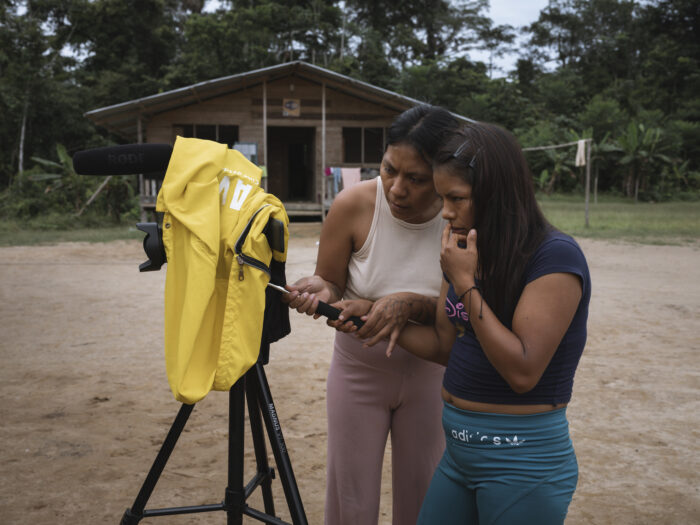
Tawna’s goal is to make Indigenous territorial defence more visible, to strengthen Amazonian cultural heritage, and accompany young people in the Amazon in learning about audiovisual communication. In line with this, their festival promotes cinema culture in Indigenous communities in the Amazon, fosters cultural exchange and dialogue between Amazonian audiences through film, and involves emerging filmmakers and producers.
Their key aims for the festival are to enable access to film in the communities, create dialogue with the audience and offer community workshops around film and solar energy, using solar power as a sustainable and renewable source for bringing cinema to to different communities – powering the transport and the mobile projections, and minimising environmental impact.
An Amazonian film programme
The programme was centred on territorial perspectives, self-expression, and different Amazonian realities. Films that won the grand jury’s hearts and took home Kanopeas prizes for Best Amazonian Film included Yoco A’icofan: Sabiduría y Territorio from Ecuadorian director Nixon Andy Narvaes of the A’iCofan people, and Mãri iHi [the tree of dreams], filmed in Yanomami territory in Brazil.
The short film Yoco A’icofan: Sabiduría y Territorio tells the story of how Nixon leads and participated in his local Indigenous Guard to defend their territory from mining. The film tells a clear story and is driven by the Sinangoe community’s needs. It proposes collective and inspiring solutions for the defence of the Amazon and reflects on the importance of preserving ancestral wisdom and plants.
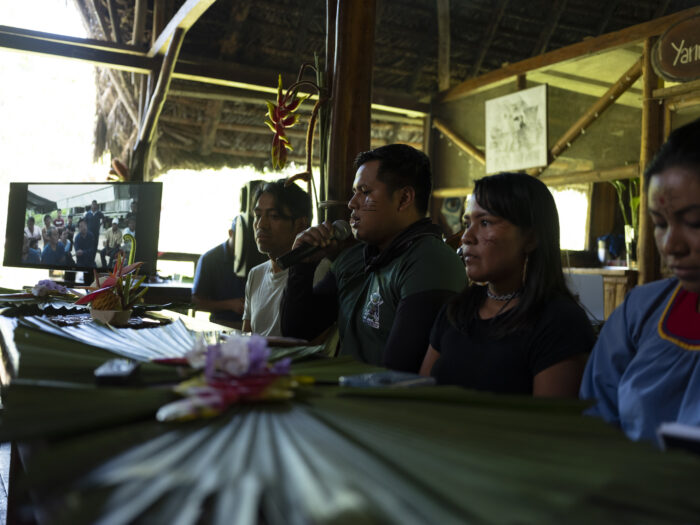
The second special mention went to the Brazilian director Morzaniel Iramari with his film Mãri iHi [Tree of Dreams], which was filmed in Yanomami territory. The film was well received by festival audiences thanks to its coherent narrative with an experimental outlook. Mãri iHi transports the audience on a dreamlike and poetic experience of ancestral wisdom and explores different ways of perceiving and representing the world from an original Amazonian perspective.
This article is funded by readers like you
Only with regular support can we maintain our website, publish LAB books and support campaigns for social justice across Latin America. You can help by becoming a LAB Subscriber or a Friend of LAB. Or you can make a one-off donation. Click the link below to learn about the details.Support LAB
Both of these films question and narrate the Amazonian reality from a perspective rooted in the territories, challenging the conventional western gaze.
Kanua’s route
In the Ecuadorian Amazon, Indigenous ways of life are systematically attacked by extractive projects – whether driven by the State, private companies, or illegal activities. The festival crew believes that showing these films in Indigenous territories can generate a sentiment of alliance. It was also important for us to travel to communities where there had never been a film festival before.
The Kanua tour included eight communities along the Pastaza, Bobonaza, and Capahuari rivers. A selection of films produced in Indigenous territories around the world and focused on Amazonian realities were screened on a giant inflatable screen, brought to each community in a solar canoe named ‘Apup’ (the word for a pink dolphin in the Achuar language). The boat’s design takes inspiration from the hulls of traditional Amazonian boats and solar panels on the roof of the boat power it through the water and also send electricity to the projector, the speakers, and the big screen.
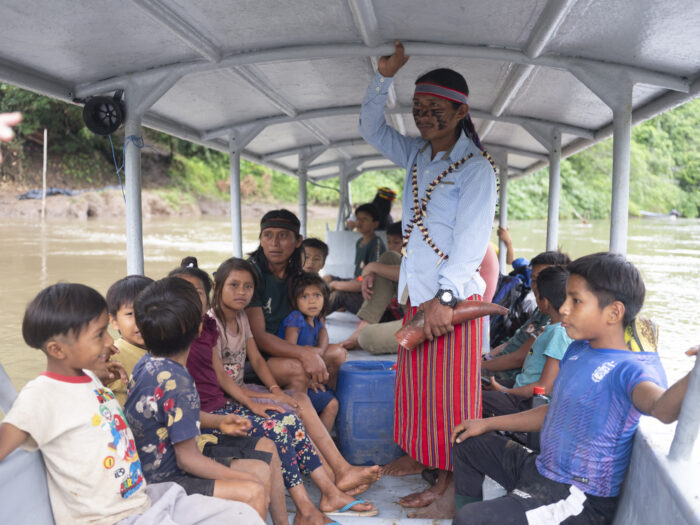
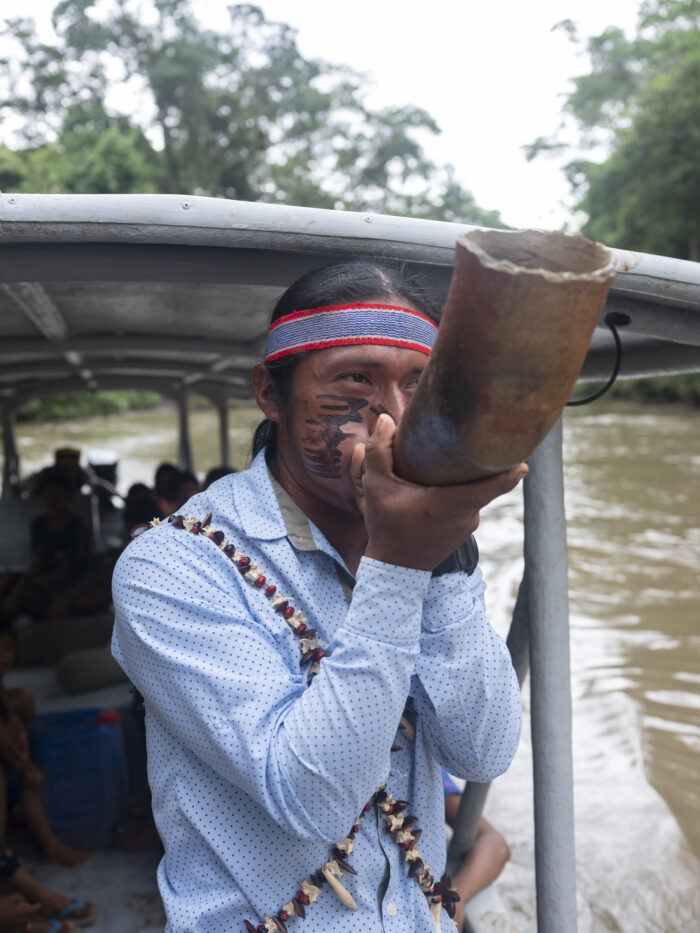
A space for mutual learning and exchange
The territory covered on Kanua’s journey is biodiverse, with mighty rivers and dense jungle, and where diverse Indigenous communities and ancestral villages live in harmony with the forest, preserving their cultural traditions and ancestral knowledge. Rich in linguistic, cultural, and bio-diversity, this territory is home to unique flora and fauna.
It was a new experience for us to travel the rivers as a team on a solar canoe. The most gratifying part was watching people’s reactions when they saw themselves on the big screen [short films created in the community workshops were also screened at the festival], and seeing communities gather in central plazas and malokas in each community to watch the films. There were people who had never been to the cinema or had only had very exceptional experiences, like Dorila Matchoa from the Sarayaku community who told us: ‘The only time I’ve been to the cinema was in the late ‘90s, to see Titantic in Puyo.’
Amongst the spectators at Kanua Festival was Elizabeth Andi, a 27-year-old artist and storyteller from the Kichwa community of Venecia Derecho, and her younger cousin, who were thrilled to see a friend of theirs acting in one of the films. ‘When my younger cousins see people like them, from their generation, doing incredible things on screen, they are inspired,’ Andi says.
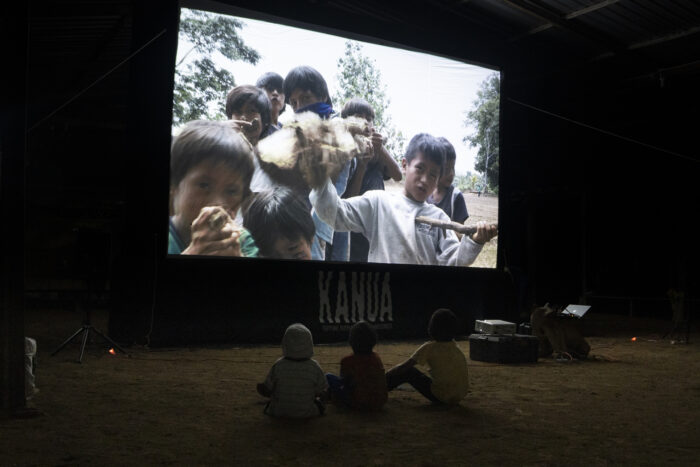
It was enriching to share cinema with diverse communities and discover similarities in the issues we face. Meeting people from different communities allowed us to better understand the specific needs of each community. Although we faced difficulties in fully integrating women into the workshops in some communities, the exchange of cultural knowledge was valuable and we learned to adapt to the changing circumstances in each place.
The future for Kanua Festival
The first edition of Kanua Festival was a wonderful experience that allowed us to connect with audiences from diverse communities, deepening mutual understanding and inspiring people to defend our territories through our different cosmovisions. We plan to host another festival in late 2024 in other communities in the north of the Ecuadorian Amazon. Additionally, our vision is to take the floating festival down new rivers, arriving in Belém, Brazil, for COP30 in 2025.
‘Now is the time to empower ourselves with these tools, to start to talk about our struggles, our visions, and our grandparents’ memories. To start making films in our territories, writing our own scripts in our own languages for our own villages and communities’, Sani Montahuano, Sápara filmmaker and Kanua Festival producer, states.
Text by Mukutsawa Montahuano y Lucia Villaruel of Tawna Collective.
Tawna members and Kanua Festival crew include Sani Montahuano, Boloh Miranda, Lucia Villaruel, Mukutsawa Montahuano, Enoc Merino, and Tatiana López. The Kara Solar team are Oliver Utne, Kayla Vandervort, Ángel Wasump, Bernarda Troccoli, Jacinto Mera, Efrén Tsamarin, Domingo Mukuchan, and Marco Santi. Independent artists Morelia Menuda, River Claure, Elizabeth Swanson Andi, and Adriana Crespo also collaborated on the project.
Support Tawna on Patreon: https://www.patreon.com/tawnadream
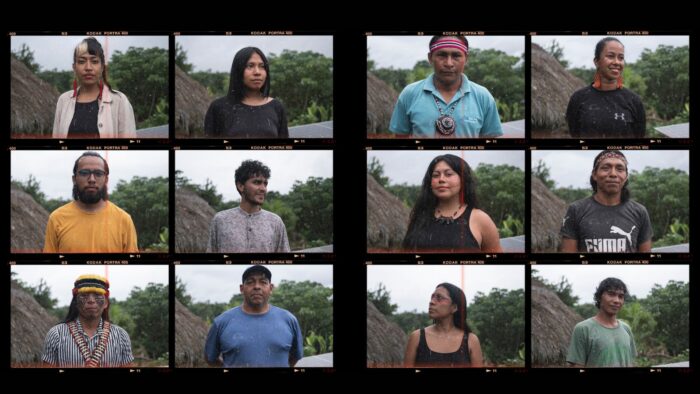
Article originally published via Latin American Bureau, find the original link here.
Follow Sounds and Colours: Facebook / Twitter / Instagram / Mixcloud / Soundcloud / Bandcamp
Subscribe to the Sounds and Colours Newsletter for regular updates, news and competitions bringing the best of Latin American culture direct to your Inbox.

